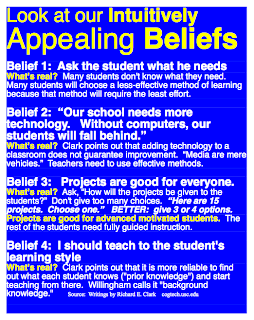 In a phone conversation in February, Dr. Clark said that he has observed two important features to a poster that communicates well (and is therefore effective) and perhaps leads to changing people's behavior.
In a phone conversation in February, Dr. Clark said that he has observed two important features to a poster that communicates well (and is therefore effective) and perhaps leads to changing people's behavior.a) There is an easy-to-remember analogy
b) There are instructions to give the reader of the poster a new procedure to follow.
The delivery truck in the poster below is an example.
 The following posters were developed over the past sixty days to prepare for a workshop. You are invited download the workshop book and develop better versions of these posters.
The following posters were developed over the past sixty days to prepare for a workshop. You are invited download the workshop book and develop better versions of these posters.DOWNLOAD THE WORKBOOK (get the posters here)
The previous four pieces can be arranged to give the full message.
A description of these posters
To get the full sense of this poster, see the paper that Dr. Clark wrote in 2005 (a chapter in a Handbook of Multimedia Learning)
 |
| Here is the link to the article |
 |
| Dr. Clark came up with this summary after reading about the Debunking Handbook.
Procedure summarized by Richard E. Clark. cogtech.usc.edu. See full document at sks.to/debunk. Cook, J., Lewandowsky, S. (2011), The Debunking Handbook. St. Lucia, Australia: University of Queensland. November 5. ISBN 978-0-646-56812-6.
|
 |
| This poster needs work. Too much text |
These two posters (above and below) are based on an article that was in American Educator in Spring 2012
Some of commentary that might be interesting about these posters was given in a series of videos on YouTube. You can see part 8 of the series here. It's a discussion about how librarians can help people with their searches.
 To close, let's look at this technique. Dr. Clark mentioned it in the interview after the group phone call had ended. It was a passing observation, an example of how a slight change in a procedure can lead to deeper work by the student ... it's the method, it's the procedure, it's not the concern over "we need better technology. The students would learn so much more if only we had more xxxx devices."
To close, let's look at this technique. Dr. Clark mentioned it in the interview after the group phone call had ended. It was a passing observation, an example of how a slight change in a procedure can lead to deeper work by the student ... it's the method, it's the procedure, it's not the concern over "we need better technology. The students would learn so much more if only we had more xxxx devices."DOWNLOAD THE WORKBOOK (<<< get the posters here)









No comments:
Post a Comment